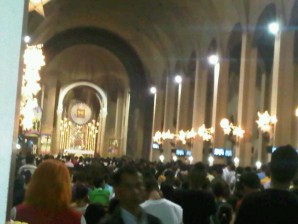
The Church, together with the academe and the media, is the institution that Filipinos trust the most, while there is much less faith in government, nongovernment organizations (NGOs) and business, according to the 2012 Philippine Trust Index (PTI). RICK ALBERTO/INQUIRER.net
MANILA, Philippines—The Church, the academe and the media are the institutions that Filipinos trust the most, while there is much less faith in government, nongovernment organizations (NGOs) and business, according to the 2012 Philippine Trust Index (PTI).
The Church (referring to all religious sectors combined) obtained a trust rating of 68.1 percent, the academe 45.1 percent and the media 32.3 percent in the PTI, a research collaboration between the EON Stakeholder Relations communications firm and the Ateneo Graduate School of Business, which is now in its second year.
The trust rating of government was much lower at 15 percent, although this has improved from 7 percent in the previous year’s survey. NGOs and business got trust ratings of 12 percent and 8.9 percent, respectively.
The PTI said the study attempts to provide a deeper understanding of the factors that create trust among institutions as well as identify the qualities and traits that Filipinos value the most.
Instructive findings
“The findings are instructive and will guide us in better understanding the way Filipinos think and establish trust, whether for an individual or an institution. For the Ateneo Graduate School of Business, the PTI highlights trust as an important ingredient in shaping effective leaders in the Philippines,” said AGSB dean Albert Buenviaje at the presentation of the survey results on Wednesday.
“The findings show us that establishing trust is a dynamic process that all institutions need to pay close attention to—and we have seen that in the 2012 trust levels increased for the government, media and the Church. This highlights the important role of communication and engagement among all organizations, whether they are building their brand, enhancing shareholder value or rebuilding their reputation,” said Junie del Mundo, chair and CEO of EON.
The 2012 PTI covered 1,575 respondents, both from the “informed” and “general public” nationwide.
Face-to-face
Face-to-face interviews were conducted between November and December last year and focused group discussions held in October 2012.
The “informed” public came from urban and rural areas, described as those who are 25 years old and above, within the economic classes A to C, has reached at least two years of college education and are a significant media consumer.
The study defined “general public” in a broader sense: 18 years old and above, from economic classes A to E and majority of whom have reached less than second year of college and have less consumption of media.
The study noted a gap between the trust ratings from the “informed” and “general public” for some institutions. For instance, there is lower trust rating from the “informed public” on the Church (56.3 percent), academe (39.5 percent) and media (24.8 percent), compared to the trust ratings that these institutions obtained from the “general public.”
The “informed public” was also noted to be more trusting of different government agencies in the 2012 PTI compared to when the index was first launched a year ago.
Trust level triples
Trust levels of the Office of the President almost tripled to 21 percent from 9.4 percent; of the Cabinet, to 14 percent from 4.4 percent; and of local government units to 14.7 percent from 7 percent. There were also improvements in trust levels for the Supreme Court, regional trial courts and Congress.
Claro Fernandez, investor relations head of the Bangko Sentral ng Pilipinas who sat as one of the panelists at the presentation Wednesday, said the improvement in trust ratings could be due to the strong economic growth posted by the Philippines.
He said the prospect of a sovereign investment grade rating for the Philippines made the country stand out last year, while most of the West, the traditional safe havens, was in disarray.
Clarita Carlos, president of the Center for Asia Pacific Studies, said some level of mistrust was good, citing the recent Arab spring that ousted dictators in the Middle East-North African region.
“Once upon a time, we thought they were gods… The entire political landscape is changing altogether,” she said.
Mistrust power
“Some level of mistrust is good for a democracy because when you say to government you trust them (too much), they can become arrogant and prone to abuse of power,” Carlos said.
The study suggested a high desire for a corruption-free government but noted that government must also deliver—such as in helping the poor, fulfilling campaign promises and providing jobs—to be trusted.